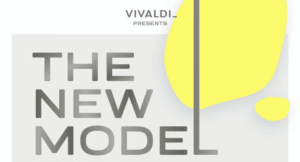Standout happens fastest when you focus on your audience over your competition. Being defined by your peers limits your ambitions and results in ‘me too’ genericism.

I went to a great event on innovation yesterday. Run by brand consultancy, Vivaldi, who I know through their recent acquisition, Gravity Thinking, it explored the changing nature of brand building.
The highlight was a diverse panel of perspectives. We had a mature dotcom native (Skyscanner) and a younger disruptor (Deliveroo), as well as a backed startup (Esme Loans, from NatWest) and an established global player disrupting itself (Hyundai).
Hearing from these different standpoints was illuminating. In particular, as Vivaldi CEO Erich Joachimsthaler, who gave a brilliantly engaging talk earlier, pointed out, none of the panel mentioned their competition.
It reminded me of a job I didn’t get many years ago. Long story short, a very famous agency CEO took issue with the fact that I didn’t intimately know the personnel and pitching tricks of his competitors.
It puzzled me. At best, that information felt like a pretty marginal gain. And more to the point, shouldn’t the focus be the solution to the client’s problem?
Fast forward many moons and that view has stayed with me. In my consultancy work, if I’m advising an agency CEO or Founder on strategy and proposition, they’ll often bring along research into their competitive set.
But rather than provide any real insight, going through that process usually only serves to underline the reasons for change.
For one, they find it hard to pin down a meaningful cohort. And then they observe a very similar spread of capabilities and language.
This dead end rarely surprises them, especially given that I’m in the room to help the agency stand out. But it does emphasise that an intimate knowledge of whoever you seek to be different from may not be that helpful.
That may sound obvious, but despite being comfortingly familiar, competitor research can sometimes obscure the real opportunity, especially as markets and threats are evolving so quickly.
What Co:definery clients are often looking for – and what each of yesterday’s speakers had – is a genuine, ownable point of difference.
In fact, the biggest lesson here is that having something different that your customers value is not an exclusive club.
Because they see scale as the missing piece of the jigsaw, small agencies often think it’s only larger, more established competitors who can stand out. Conversely, big agencies sometimes envy smaller indies’ agility, presuming it’s unattainable for them.
But as the panel proved, an audience-centric point of difference isn’t solely the preserve of the nascent disruptor or the well-funded spinoff from a benevolent parent.
And as the event’s host, Gravity Thinking’s Andrew Roberts said, “your competition might not be the competition”. Case in point, as panelist Ianina Lucca (now of Skyscanner) recalled of her time at Just Eat, their competition was the phone.
So if you’re an agency CEO looking to improve standout, sales and margin, it’s worth remembering a couple of things that relate to ambition.
Firstly, knowing your market is far more about creating value for an audience than how your current competitors have chosen to operate.
And secondly, there’s no barrier – and no time like the present – to embrace a more progressive approach. If it’s only inertia holding you back, then you really have no excuse.